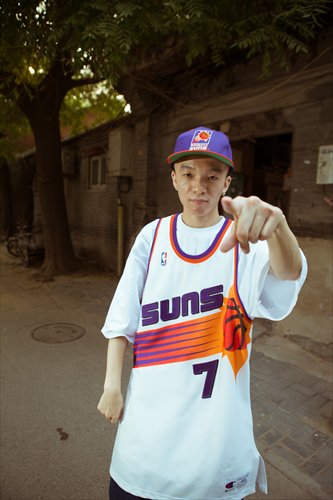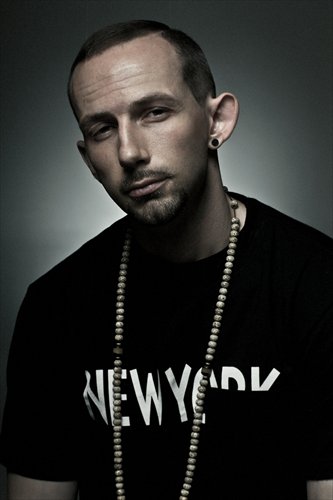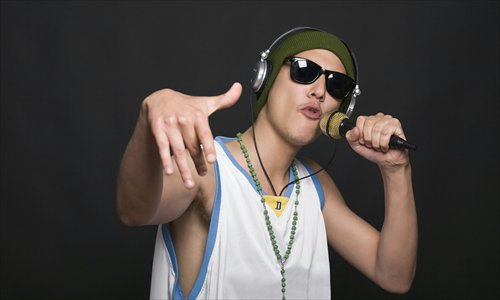Gettin’ Bei-jiggy
Local rappers intent on growing China’s hip hop scene

Nasty Ray, a Beijing rapper who wants to bring underground rap to night clubs. Photo: Li Hao/GT
Nasty Ray politely elbows his way through the crowds of tourists slowly making their way along Nanluoguxiang, Dongcheng district. In his trademark basketball top, low-hanging jeans and sneakers, he was sweating in the summer sunshine.
His distinctive hip hop fashion defines his identity as a rapper.
"I am often asked if I am a street dancer which I am not," said the 27-year-old Beijing native Zhang Rui, better known as hip hop musician, Nasty Ray.
On July 17, Zhang emceed a Natural Flavor freestyle rap performance at Yugong Yishan, one of the most popular pubs for Beijing's underground rap community. He invited his friends jfever, Soulspeak, Itsogoo and MainVersion to rap and have fun together.
Originating in the Bronx in New York City in the 1960s and 1970s among African American youth, hip hop has become a global cultural movement, especially reflecting the social, economic and political ideas of the youth.
Manifesting in four cultural forms: rap music, DJing, b-boying and graffiti art - hip hop culture was first introduced in China in the late 1990s.
Today, non-commercial underground rap performances are held at live music venues almost every weekend.
"A lot of people call themselves rappers. But less than 10 of them are wholeheartedly engaged in hip hop and are influential in Beijing," said Zhang. "I am determined to break down the barriers of hip hop and club music, bringing the underground music to more night clubs in Beijing."
China's rap epicenter
The capital Beijing is at the center of rap music in China. Rappers and hip hop fans turn to Beijing for inspiration when creating their music and holding performances, said Zhang.
"In China, rap as an underground form of music is popular at live music venues in Wuhan (Hubei Province), Guangzhou (Guangdong Province), Xi'an (Shaanxi Province), Chengdu (Sichuan Province) and Shanghai," said Zhang.
"In Shanghai the hip hop atmosphere is more commercial. Rap in the northern part of China is more hard, whereas in the south, it is softer and smoother."
Zhang is loyal to "old school" hip hop, the style of music that had its golden years in the West in the 1990s.
"Beijing's hip hop culture originated in the Sanlitun area," said Zhang.
"I live in Tuanjiehu, a short distance away. When I was a child I liked listening to rap at the bars or looking at the graffiti there. I thought the rhythm and pace were really cool even though I didn't know what they were rapping about," he said.
"My favorite NBA players loved hip hop star Jay-Z, so I listened to Jay-Z too."
This is why Zhang felt extremely honored when he was invited to rap "Beijing Ducks (The Champion Is Here)," at the China Basketball Association Final between the Beijing Ducks and the Guangdong South China Tigers at the Beijing MasterCard Center in 2014. Another of his well-known rap songs is "Beijing Guoan," dedicated to Beijing's local football team.

Jackson Turner, one of the expat rappers in Beijing. Photo: Courtesy of Tang Xiaoning
Freestyle battles
For Chinese rappers, participating in hip hop freestyle battles is an important way for their music to be heard.
Huang Xu, 25, originally from Xinjiang Uyghur Autonomous Region, who just released his first album Ziwo Jiushu, literally translated as "self redemption," is a frequent winner of such battles.
Huang said when he was a child, he dreamed of going to Beijing. After achieving his goal by studying at the Beijing University of Chemical Technology, he found a job in Beijing. But his life took on a new direction after he watched a freestyle rap battle at Yugong Yishan, organized by Iron Mic, one of the most influential hip hop associations in China. "I decided to become a rapper and quit my job in 2013. I kept practicing rapping freestyle six hours a day, with the aim of winning a title." Later that year, he spent 26 hours on a train from Beijing to Shenzhen, Guangdong Province, to take part in a freestyle battle, and finally got his first taste of victory at the Iron Mic. In 2014, he placed first at the Beijing Iron Mic freestyle battle.

Photo: IC
From the Big Apple to Beijing
The local rap scene is also attracting foreign hip hop musicians looking to make a name for themselves in China. A fluent Mandarin speaker, Brooklyn-born Jackson Turner, grew up in New York. He is among a group of expat rappers thriving in Beijing's music industry. Turner came to Beijing in 2003 because he was frustrated by certain aspects of the US and wanted to meet people who "were far away from American influence and see how they thought and viewed the world."
Having spent his youth in New York, he witnessed social inequality especially among minority groups and the poor. "When I was 18 I saw a kid get shot five times right before my eyes. This incident had a deep impact on me, and pushed me to search for answers to the social problems we face in the US."
Living in China for 12 years, Turner "discovered people throughout the world deal with similar problems, and a true tolerance and respect for all people is the only way forward."
In July, he released his new album The Foundation, attempting to "get back to the roots of the music and culture, while still being fresh and innovative." The album consists of five songs, each representing an art form of hip hop, ranging from the philosophical, to party groove, to hard hitting critique and romantic love songs.
"Hip hop has always been more than just music to listen to in the club but a culture and a world view. The music needs to have a message," said Turner.
Meaningful lyrics
Globally, censorship is one of the major problems faced by hip hop musicians. Many lyrics are criticized for being too negative and anti-establishment as well as using violent and foul language. This is true in Beijing too.
"Does using foul language mean delivering passive energy? If you want to understand Chinese rap you'd better listen to Real Sh*t to know what we are truly talking about," said Huang. "I believe it will impress you more than words from your boss."
One of Huang's popular songs "Tiantang Laixin," literally translated as "a letter from heaven," is a tribute to his friend who died in a drunk driving accident. "I want to tell the story of my friend, reminding people to cherish their life," said Huang. "A good song, no matter the genre, will give people hope and reflection," said Huang. "I don't want our children only to be influenced by violent and pornographic culture. I hope when I have a child, he or she will love to listen to my songs and understand my life's philosophy via the songs."
Making a living
"It is hard to earn money just from underground concerts," said Zhang.
Zhang works regularly at the Yugong Yishan live music house as a DJ. Sometimes he takes his music to night clubs such as Mix. He spends eight hours a day digging for material and getting inspiration from other rappers around the world.
From the age of 16, Zhang has regularly participated in freestyle rap battles. The prize money and the fees he charges for commercial performances allow him to be financially independent. Although he studied piano tuning at the Beijing Jinsong Vocational School, he never worked as one.
In Turner's opinion, one thing that is essential for the development of hip hop in China is financial support.
"Whether this means the direct support from record labels or the indirect support of sponsors and independent organizations, the fact is that without financial investment in the music there will be no future," he said. "From what I have noticed, there seems to be much stronger support for the dancing side of hip hop, and very little support for original Chinese language hip hop music."
While Huang said up until now, he has hardly accepted any commercial performance invitations, he plans to increase his national concert tours to make his music more financially viable. "My own team GYC Present and Trouble X and IllmicD will release their albums and we will jointly launch a concert tour," said Huang.
Zhang has a multi-dimensional approach to his music. "Although I have never thought that I will one day become a mainstream musician, my aim is to make hip hop music that can both make money and deliver my music ideas. I will be selective about which commercial performances I will do," said Zhang.